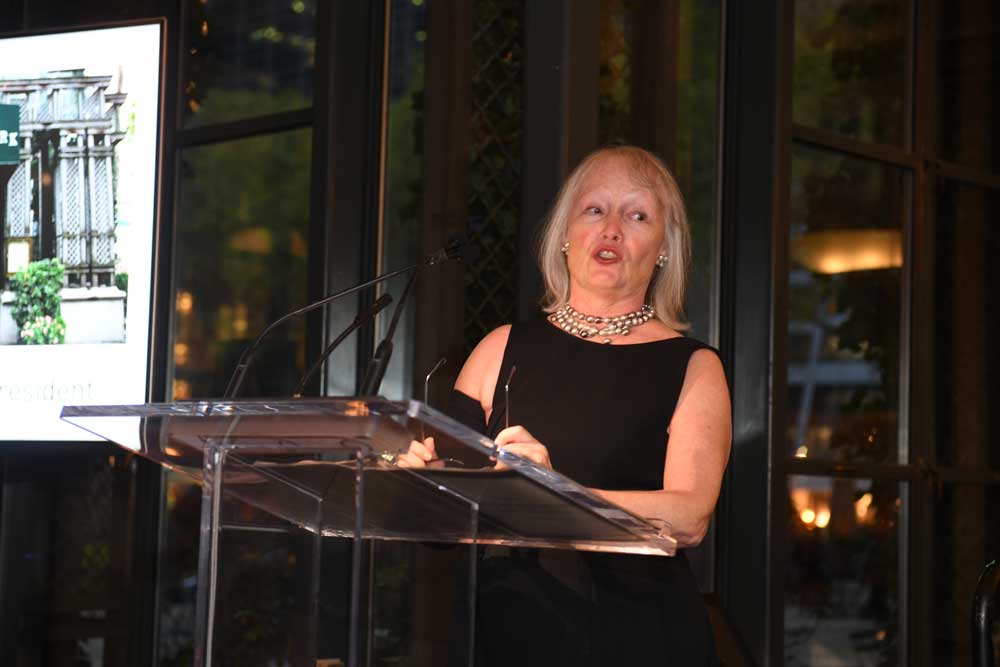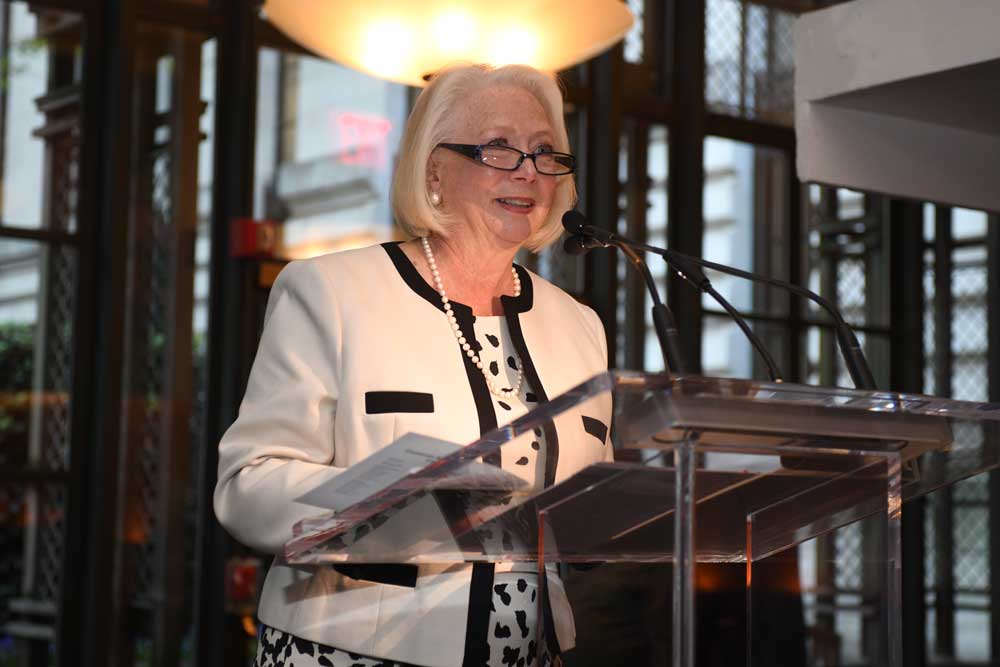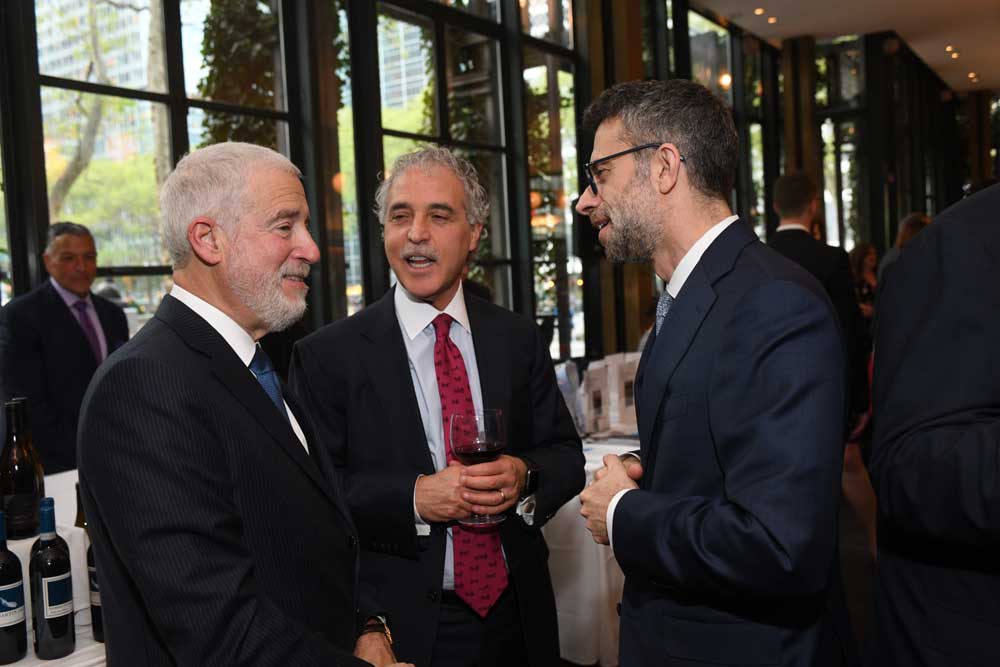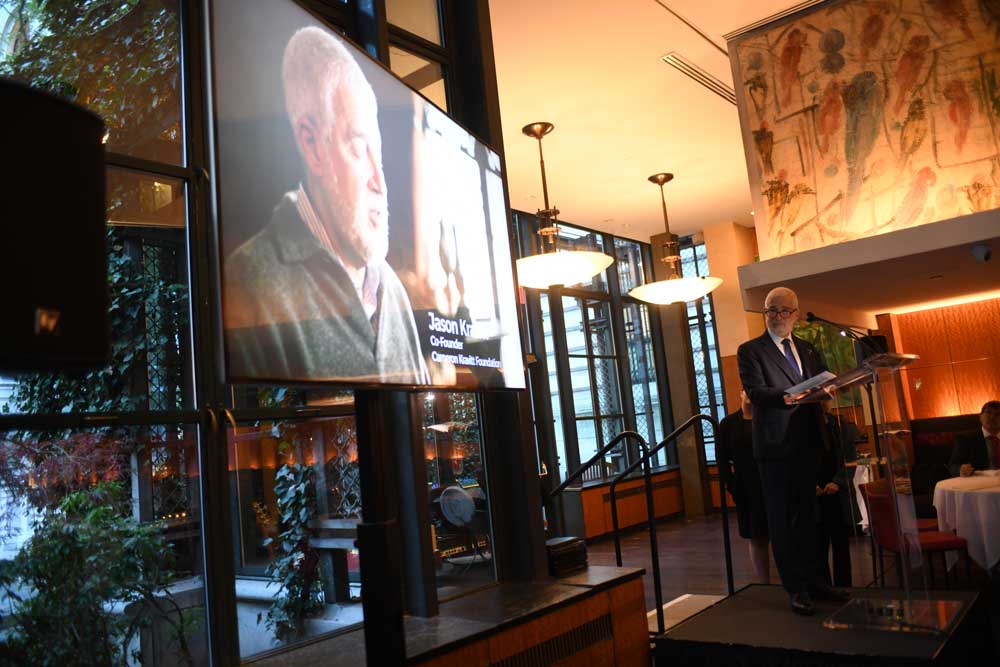Pediatric Leaders
“The Department of Pediatrics at The Johns Hopkins University School of Medicine is immensely grateful to the Cameron Kravitt Foundation for the valuable and continuous contributions it has made to the education of young Hopkins pediatricians for the past two decades. The Cameron Kravitt Death and Bereavement Seminar at the Johns Hopkins Children’s Center has taught more than 450 pediatric residents, more than two dozen chaplain students, and multiple faculty and staff from many disciplines about the importance of compassionate, humanistic and family-centered care at the time of a child’s death.
“Our pediatric residents go on to practice throughout the nation and world – and the lessons they learn during the Cameron Kravitt Foundation seminars are instilled in all the young physicians they teach and benefit all the patients they treat.
“The Cameron Kravitt Foundation’s continuing dedication to this mission has inspired all of those who have had the privilege of working with it – and the honor of perpetuating the amazing legacy it has created in honor of Cameron Kravitt.”
— George Dover, M.D., pediatrician-in-chief of the Johns Hopkins Children’s Center, professor and Director of the Johns Hopkins Department of Pediatrics and Janet Serwint, M.D., professor and Vice Chair of Pediatric Education and Director of the Johns Hopkins Harriet Lane Pediatric Residency Program.
“The death of a patient is one of the most difficult experiences a pediatrician will ever encounter. Providing training and practice to pediatric residents in how to respond to such tragedies is essential to prepare them emotionally, and to help them to be able to provide the very best care they can to families in crisis.”
“Countless times I have received feedback from residents who have graduated, commenting that they had a similar experience in their career and the strategies from the seminar came back to them. This type of program needs to be available to all pediatric residents.”
— Janet Serwint, M.D., professor and Vice Director of Pediatric Education and director of the Johns Hopkins Harriet Lane Pediatric Residency Program.
“Physicians go into pediatrics to keep children healthy and happy. Death is not supposed to be a part of it. It’s an incredibly difficult skill to learn how to support and comfort families while you yourself may feel anger, sadness, loss, disappointment or failure. Similar skills are required to give families the news of a difficult diagnosis or the need for difficult testing – or in other scenarios in which anything is not perfect for the child whom you’re treating.
“Since 2006, the annual Cameron Kravitt Foundation Death and Bereavement seminars at Weill Cornell Medical College’s Department of Pediatrics have been invaluable for teaching young pediatricians how to deal with these extraordinarily difficult situations. We in the Department of Pediatrics are proud to be a team that continually strives to improve the care for children – and understands the needs of a patient’s family members as well. That admirable goal is fostered immeasurably by the generosity of the Cameron Kravitt Foundation.”
— Susan B. Bowtwick, M.D., professor and Executive Vice Chair for Education and Administration in the Department of Pediatrics and Chief of the Division of General Academic Pediatrics at Weill Cornell Medical College.
Pediatric Residents
Pediatric residents and pastoral care residents who have experienced the Cameron Kravitt Foundation’s emotionally challenging but remarkably effective training in how to deliver bad news and care for families facing the death of a child – which features professional actors known as “standardized patients” portraying the parents of a child who has died – are asked to complete a questionnaire on their experiences following the seminar. Their comments attest to the fact that they believe they have benefitted immensely from the Cameron Kravitt Foundation’s programs:
Hopkins Residents
- “I think it’s a great seminar with wonderful facilitators…. I can’t think of anything that would make this experience any better.”
- “The actors felt very real. Immediately after we started talking, I felt as if I was talking to real parents about their child. I did not know what to expect, how they would react – which is often the case in real life. It was tough because I wanted to be as supportive as I can and I was figuring out a way to do so. The feedback [from fellow residents and the standardized patients] helped me as well.”
- “I found this experience valuable, especially given that I was rotating through the PICU [Pediatric Intensive Care Unit] at the time. The actors’ feedback from all of the residents’ turns helped. I later had to give bad news to parents over the phone that same night, and applied the feedback I had received to that talk. Even though it’s nerve-racking, I highly recommend the standardized patient experience.”
- “I thought that the entire day was great. While it was exhausting to spend the whole day talking about the sadness of losing patients and having to deliver that news to the family, I thought that overall is was a very helpful experience for us. The main thing I took [away] from it was to be much more aware of my mannerisms. So many of us have them and don’t realize them until we see them in others.”
- “I think observing fellow residents actually makes these interactions more beneficial. It gave me an opportunity to learn and walk through the experience with them. Every reaction to bad news is different, and the next best thing to actually being in the middle of it is to be a very close observer.”
- “I feel that this seminar was valuable in not only allowing us to experience the discomfort and anxiety of delivering what could possibly be the worst news a family could get in an incredibly safe place, where we are allowed to process [the experience] afterwards, but to allow us to remember why we are physicians and to bring us back to a place where emotions and humanity can be found and experienced without shame or the pressure of having to ‘get back to work.’”
- “I definitely think this is something that everyone should experience. Telling a family that their child died is never, ever easy, and if it is, I’m going to look for a new line of work. Giving bad news is not about you, it is about the family that is receiving it. Whatever their reaction might be, it is not necessarily directed at you, but at their situation. You are there to do your best to be empathetic, understand, and facilitate whatever emotional response that needs to happen, but you can never, ever fix everything. Yet you also need to take care of yourself before you can take care of anyone else, otherwise you turn into a shell of a person.”
- “You can prepare hypothetically only so much. This felt like doing ‘it’ for real the first time. A luxury before the real first time.”
- “It couldn’t have been more realistic unless we actually did it in the PICU [Pediatric Intensive Care Unit].”
- “It was particularly helpful to see how many peers struggle as well in similar situations and what we can learn from this.”
- “I learned that we as physicians have so much power to help families prepare for the death of a dying child.”
- “The seminar reinvigorated my passion for being a doctor.”
- “Thank you for the opportunity to attend the death and bereavement seminar. Sharing bad news and being with a patient in a difficult time is crucial to the development of competent, compassionate physicians. I felt privileged to attend the seminar and learned skills that will serve me throughout my career, as we all continually strive to better serve our patients. Thank you.”
- “Listening to Mr. Kravitt speak and our experiences with the standardized patients gave me a better appreciation for how common situations that we take for granted as medical professionals can be completely life-altering for patients and their families. It taught me the importance of treating each case through the eyes of the patient even if I’ve seen it many times before as a clinician. Each experience is unique.”
- “Thank you for your continued support of our Death and Bereavement Day. The second year of residency is very challenging as we encounter death and dying on many rotations – the Pediatric ICU, the Neonatal ICU, and Oncology. Having the opportunity to come together as a class to both learn about and discuss these challenging topics is invaluable as medical providers in-training.”
- “Thank you so much for continuing to provide us with this day of education. It truly helped me reflect on my previous encounters with difficult conversations and think about how I can improve upon my patient interactions going forward. It was a beneficial and memorable day and I hope to put into place some of what I learned in all my future patient encounters.”
- “I greatly enjoyed the Death and Bereavement Day; the skills taught were invaluable. I cannot remember if it arose in small groups or the parent panel, but my biggest lesson learned, which I’ll use day-to-day, is how jarring and disheartening it can be for families to hear things we as physicians say everyday (certainly a common theme for our profession, but it was so helpful to have a space to discuss this in detail); the example we discussed at the seminar was holding a child’s feelings, and how important that is for parents/family. Then the day after the seminar in the PICU, I had to discuss with a family the possibility of a g-tube placement. The family was understandable upset. Before the seminar, I don’t think I appreciated the gravity of parents losing future expectations. And although this child did not die, I can still use the skills we learned to discuss this news with parents.”
- “For our small group, the simulations during which we had to tell parents that their child had died were particularly powerful. Several of us have already undergone similar experiences in real life, and we found that participating in these simulations unexpectedly uncovered strong emotional reactions likely related to these previous real-life experiences. An unintended but valuable result was that revisiting similarly painful experiences in a safe space actually helped us process aspects of those real-life experiences many months – or years – later. Our group also found the parent panel to be enlightening in that we often are present for the immediate aftermath of a child’s death but have little continuity as to how families manage the ongoing grieving and bereavement process. I can think of at least 3 comments made by the parents on the panel that will be seared into my memory forever. I have no doubt that we are better pediatricians for having participated in these simulations and for having had the chance to really, fully hear the stories of parents who have lost a child. Thanks for a wonderful seminar and for continuing to offer this opportunity to future second year residents – my group loved it and thought it was an incredibly valuable experience!”
-
“The “Death and Bereavement” seminar was a whirlwind of emotions that placed me in the shoes of the parents of the dying child and allowed me to sit for a moment with that feeling of loneliness, bitterness, and pure sadness. And, at the same time, I was able to see how something beautiful that can grow of out of it with healing, strength, and unwavering support from hospital staff, physician, and the community. The parents of these passed children carry such a bright light within them of courage and audacity. I am inspired by that warmth, and I hope to continue to learn to provide encouragement to kindle that light in others in the future. It was a beautiful seminar”. – comment from resident
-
“Although each case, and each person, is different — the opportunity to practice discussing these difficult topics and assessing how I personally feel, the emotions I contend with, and what I show to the families was hugely beneficial to my growth as a physician and caregiver”.- comment from resident
- “I found it to be a really important experience and I really appreciated the opportunity to practice with the standardized patients having those incredibly difficult conversations. I learned invaluable skills including centering myself before delivering bad news, allowing myself to be comfortable with silence to give a family time to process the information, and how to use therapeutic touch to convey my concern and support. Having the family panel to hear about individuals’ experiences with communication from the health care team regarding the death of their child was the most important part of the day for me and I really appreciated those couples be willing to share those painful experiences with us”. – comment from resident
-
“ The Cameron Kravitt Foundation seminar was an incredibly helpful and moving experience. These conversations are always some of the hardest conversations to have and it was very helpful to practice having this conversation, which I found overall quite realistic, and to receive immediate feedback. I also thought it was immensely instructive to watch my colleagues deal with different reactions and feel that I gleaned something from each encounter, which I will be using in my clinical practice going forward. I appreciated the recognition of how unique each encounter and family is, that learning to have these conversations more skillfully is a career-long endeavor, and that sometimes despite our best efforts, these conversations will not go as we would wish, but that ultimately, the most important thing is that we are well-intentioned and do our best to develop these skills. I found the parent panel to be incredibly moving and powerful. Their insights and their descriptions of their experiences are not something that we often get to hear after their child has died and I am sure that I will be holding onto some of their shared wisdom for the rest of my career” ……. “This day brought back memories from each of the deaths that I have witnessed over the last year and half and was, in many ways, therapeutic in the way it allowed me the space to process it now months afterwards. The seminar, for me, was a renewal of the commitment that I have to attempt to provide families with compassionate, honest, and sensitive care despite delivering the worst news that any parent has to hear. Thank you so much for allowing us this opportunity!”-comment from resident
-
“Thanks for including us in the simulations. It gave me a chance to see the other side of Doctors, their compassion and vulnerability. It also help me see things from a patient’s point of view which has changed my patient care for the better.”- comment from chaplain resident
-
“The Kravitt Foundation Death and Bereavement Seminar was truly a remarkable experience. I enjoyed it from beginning to end. I loved the reenactment of different patient scenarios. That truly was touching and real. Through this foundation I gained a whole new respect for the medical staff and all the sacrifices they make. Mr Kravitt was a part of my group and the wisdom that he brought from life experience really made this seminar touching and memorable. The Kraviit foundation is something very special and is definitely a much needed resource to all hospitals. I appreciate all that Jason and Beverly Kravitt and members of the Kravitt Foundation Board have done to make this experience authentic and special.”- comment from chaplain resident
-
“This is one of my favorite days here at Hopkins Being able to witness the phenomenal heart and brain work that residents experience-the connections they draw from previous patients and families and how they weave in their own personal experiences with difficult news and loss-is such an honor and such a growing and rejuvenating experience for me each year”. Comment from faculty
-
“Having the opportunity to discuss religion/spirituality in medical care, in my mind, encourages the residents to include such discussions with their patients and to reflect upon their own beliefs in times of crisis. Having done the seminar as a resident (1997, I believe it was the 2nd or 3rd session), I can say that it’s still as wonderful now, and has improved over the years!”- comment from faculty
-
Every year I leave with a profound feeling of personal satisfaction that I was able to participate in such a meaningful and important event. I deeply appreciate the opportunity to help physicians think about the contexts in which they serve and some of the individual variables that show up in situations where such emotionally charged information is being shared. As I drove home after our training this year I was thinking about the broad influence Cameron continues to have. You have trained hundreds of physicians that have been present with thousands of families in the most delicate times of their lives. Thank you for creating and sustaining such a focused and well thought out program. Thank you for continuing to invite me to be a part of it. Thank you for continuing to keep Cameron alive through such important work.”- comment from faculty
UCSF Benioff Residents
- “Delivering the news to parents of the death of a child is something that residents rarely get to practice and almost never get feedback on. Being able to practice this high-stakes skill in a safe yet realistic environment allows residents to feel better prepared to care for families going through tragedy. The faculty appreciate the time for their own self-reflection and for conversations that are hard to find space for in the busy pace of clinical care. Several residents emailed following the seminar that they put the lessons to use in the week following the seminar. This timely, high-quality seminar is made that much stronger by having the Kravitts discuss their own experiences at the morning introduction. Residents immediately understand the importance and gravitas of this topic and are committed to using the seminar day to improve their ability to provide compassionate care.”
Cornell Residents
- “[The seminar] allowed us the opportunity to deal with the parents’ emotions and try to make sense of our own emotions”
- “By practicing, I’ve definitely gained a lot of insight.”
- “Delivering bad news is really hard but a really important skill to have and continuously work on.”
- “I learned how difficult it is to give bad news and although there is no one perfect way to do it, there are ways to really help parents get through such a tragedy.”
- “Helpful to practice language….as the words you chose are so important when delivering bad news.”
- “This was incredibly useful and relevant; it is one thing to learn about how to approach families with bad news – it’s another to actually practice and have to formulate a meaningful interaction.”
Cameron Kravitt Death and Bereavement Seminar – UCSF 2017
Responses to “What did you like about this seminar?”
From residents:
- “Debriefing opportunities; How many of our faculty staff joined us – showed me how important this topic is.”
- “Hearing from the parent panel was very helpful, I had no idea that certain things can be said – both good and bad – that they will never forget as long as they live.”
- “I really benefited from the SP sessions in the morning; the materials provided before the session were excellent; the debrief after lunch (open-ended) was essential and generated space for reflection and learning.”
- “A full, protected day with faculty, experts, and each other – I couldn’t be more grateful for it. Thank you for valuing this part of our training and experience.”
- “Everything! Such a special opportunity to come together around a specific, constructive topic and do productive work around the most meaningful center of our profession, facilitating the connecting between us as providers across disciplines and training years.”
- “Hands-on practice; safe space; supportive services.”
- “Debriefing in small groups; listening to personal encounters of physicians; hearing from patient families.”
- “Amazing standardized patient encounters; thoughtful small group discussions.”
- “Enough time and space to allow myself to be vulnerable and stretch my skills to the max, therefore allowing myself to capitalize on this learning.”
From faculty:
- “An important experiential encounter to begin to the explore strengths and challenges and communicating bad news and heightened awareness of importance of self-care to do this work.”
- “Parent seminar was beautiful. Timing and coordination were impressive. Use of 4 person small groups was good size.”
- “Very interactive, started great conversations, good mix of information and hands-on practice. Palpable increase in resident comfort with delivering bad news.”
- “The residents seem already to have so much natural heart and care and the faculty seem incredibly, genuinely supportive of each resident. This is obviously a well-honed training that has been more and more finely tuned for max impact over time.”
- “This seminar was particularly well organized. The preparation that went into preparing the staff was well worth the time and effort. The actors were well trained and made the experience life-like for the residents, which is no easy task.”
- “The SPs were so powerful as was the family panel.”
Feedback from Directors





